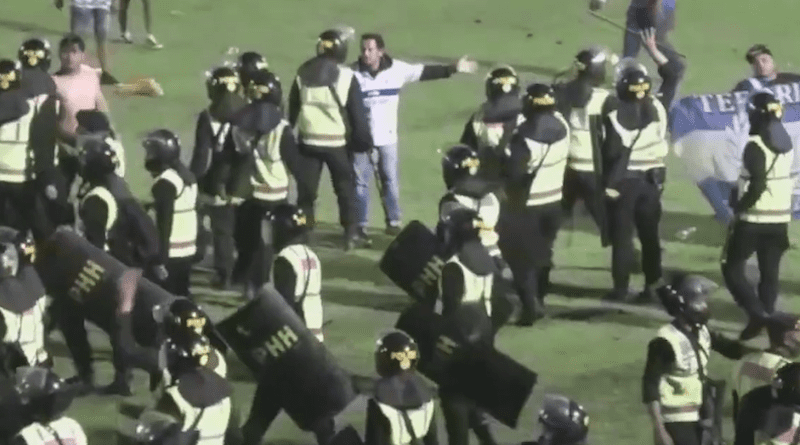U-20 World Cup Ejection Deepens Quagmire For Indonesian Football
By BenarNews
By Eko Widianto and Arie Firdaus
Dayangga Sola Gratia managed to escape alive from a deadly stampede at a stadium in Indonesia last year, but not unscathed. He still suffers from traumatic stress disorder and chronic breathing problems.
Dayangga was among thousands of fans who had packed Kanjuruhan Stadium in Malang, East Java, last Oct. 1 to watch a match between host Arema FC and their archrivals, Persebaya Surabaya. It ended in tragedy when police fired tear gas to disperse angry fans who stormed the pitch after Arema lost.
A stampede ensued as spectators tried to flee through narrow exits. At least 135 people were killed and hundreds more injured in the chaos, one of the world’s worst disasters at a football stadium.
“I promised myself to never watch football again,” Dayangga, 23, told BenarNews.
Nearly six months to the day marking that disaster, Indonesian football plunged into deeper turmoil last week when FIFA, the sport’s world governing body, announced it was stripping Indonesia of its rights to host the Under-20 World Cup in May and June, citing “current circumstances.”
This double whammy – the cancellation of Indonesia’s hosting duties for the tournament, combined with the stadium tragedy – has raised questions about the country’s ability to host major international events in the future.
It has also cast a spotlight on the management and governance of the sport, which in the country has been plagued by corruption and violence for years.
FIFA’s decision shocked and angered fans and players in a country obsessed with the Beautiful Game, despite Indonesia’s perennial underachievement on the global football pitch. Not only did FIFA deny Indonesia hosting rights but, due to the rules to qualify for the tournament, the country’s Under-20 squad also saw their dreams of playing at all in the U-20 World Cup dashed.
With only a few weeks to go until the Indonesian team was to host the opening match and give their nation a lift after the tragedy at Kanjuruhan Stadium, FIFA President Gianni Infantino gave Indonesia the boot.
He delivered the kick after some politicians and Muslim groups here had aired their opposition to the Israeli team’s participation in the event, citing the Jewish State’s occupation of Palestinian land. Indonesia does not have formal diplomatic relations with Israel and is a longtime staunch supporter of Palestinian statehood.
The stadium stampede, experts noted, exposed glaring deficiencies in crowd control and safety measures at Indonesian stadiums.
An independent team that investigated the disaster made several recommendations to improve standards for safety and security at stadiums and before, during and after matches. These included installing more exits, limiting ticket sales, training club stewards and investigating police personnel who fired the tear gas.
But the authorities and the Indonesian Football Association (PSSI) haven’t seriously implemented most of the recommendations, said Akmal Marhali, a member of the team.
Only five suspects went on trial on charges of negligence for the stampede, but only three were convicted. The three – a policeman and two Arema officials – received sentences between 12 months and 18 months in prison.
“The entire legal process is very disappointing,” Akmal told BenarNews.
Another member of the independent team, Rhenald Kasali, said more people should be brought to justice for the tragedy, including officers who fired the tear gas.
“Clearly videos [showing details of the incident] are widely available. It’s easy to collect evidence, but no further action has been taken,” he told BenarNews.
He also said there had been little effort to improve stadium and match security standards.
“Don’t just focus on revenue at the expense of safety,” he said.
There has been a lack of supervision from PSSI and LIB – the league operator – over the implementation of these measures, according to officials from two League 1 clubs, who spoke to BenarNews on condition of anonymity due to the sensitivity of the issue.
They highlighted two latest incidents: an attack on a visitors’ team bus by a group of supporters of the home team in January, and slow medical treatment for a player who passed out after colliding with another player last month.
The officials argued that both incidents could have been prevented or handled more effectively if there had been better coordination and oversight.
In January, PSSI held an extraordinary congress and replaced its management.
One of President Joko “Jokowi” Widodo’s most trusted aides, State Enterprises Minister Erick Thohir, was elected chairman of the association. Erick once owned the U.S. Major League Soccer side D.C. United and Italian Serie A club Inter Milan.
Last week, Erick said he had also been tasked with transforming Indonesian football in the wake of the U-20 World Cup hosting fiasco and was committed to avoiding FIFA sanctions that could isolate Indonesia from international football.
“The president clearly said we should not be sanctioned, and we should finish the blueprint for the transformation plan as soon as possible,” Erick told reporters, adding there was a lack of confidence that Indonesia was serious about transforming the sport.
“I will also work hard to renegotiate with FIFA and avoid any sanctions that could happen. The president does not want us to be isolated from the world soccer map,” he said.
Indonesia has a history of facing FIFA sanctions for government interference in its football affairs.
In 2015, FIFA suspended Indonesia’s membership and banned its national and club teams from international competitions after the sports ministry froze the soccer federation over a dispute involving two teams with dual ownership or management issues.
The suspension was lifted in 2016.
But for many football fans like Dayangga, the survivor of the stampede, the prospects of Indonesian football are bleak.
“They only care about money,” he said of the sport’s caretakers in his country.

